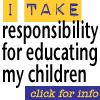
|
The Education Liberator, Vol. 3, No. 4, May 1997 Who's in charge of Johnny's personality?by Andrew J. Peterson Established criticism of homeschooling these days tends to avoid ? with good reason ? questioning its academic quality. On average, homeschooled students score at the 77th percentile on standardized tests such as the Iowa Tests of Basic Skills according to the Home School Legal Defense Association. Instead, the critique more usually hits a supposed failure to "socialize" the students ? to teach them how to interact in society. The December issue of the American Psychological Association's publication Monitor, for instance, features a report by Monitor staff reporter Bridget Murray that points to a new "wariness" among psychologists about parent-directed homeschooling. After first listing several benefits homeschooling provides, Murray turns to concerns raised by a small number of professional psychologists. There is, Murray writes, "an enormous need for outcomes research" in the area of "social development." Talking with psychologists, Murray reports, elicits such questions as whether homeschoolers are "trying to protect children from becoming adults?" Will their children be misfits with mainstream life when they are older? Will they be sheltered completely from diversity in our culture? Will they go against what society values as proper behavior? (We should all be reaching for our Politically Correct dictionaries about now.) It isn't as though APA believes cultural norms should set every standard for child rearing. On the contrary, the December Monitor also includes articles titled: "Raising children to resist violence: What you can do" and "What makes kids care: Teaching gentleness in a violent world." In addition, in another publication on its Web site ("Answers to your questions about sexual orientation and homosexuality"), the APA does not hesitate to argue, with little regard to society's conventions and traditions, that homosexuality is pre-determined, unchangeable, and healthy. But when it comes to homeschoolers, suddenly APA registers deep worries about the possibility of failure to conform with societal norms. The psychologists' concern for shaping our children's social development did not appear out of the blue; it has a long history. Turn-of-the-century psychologists were notorious for writing novels sketching Utopian schemes controlled by "professionals" in which family life would be replaced by social engineering and traditional religion run out of town. The discipline has a long tradition of using the public schools to direct personality development quite apart from the academic goals the public assume are pursued. In 1983, noted UCLA education historian Professor Sol Cohen wrote an article published in the History of Education Quarterly that recounted the "mental hygiene movement" that began with small committees of intellectuals and professionals during World War I. John Dewey, who at the time was considered the world's foremost educational psychologist, was a guiding influence and leader of the movement. In the 1920s, these individuals established the new child guidance clinics and their ideas took hold in teacher education textbooks in the '30s. Personality development became a key priority for public education. Just as physical hygiene had proven crucial for the urban public health crises of the late 1800s, they argued, so should a mental hygiene program of psychoanalytic and behaviorist psychologies be implemented to prevent schizophrenia and juvenile delinquency. In 1950 the summary statement of a White House Conference on Children announced that the public education system was indeed the primary agent for socialization of the nation's children. John Dewey's dream that social development should replace academics as the dominant concern of American education had arrived. As a graduate student at U.C. Berkeley in the mid-1970s, I was the beneficiary of a National Institute of Mental Health fellowship for the study of "mental health consultation in the public schools." Seemed like a good idea at the time, but there were two problems. First, theoretical textbooks notwithstanding, I found that no specific, measurable, agreed-upon, realistic, timed, operational definition of mental health existed. Second, every minority group on campus had developed its own "wariness" about how "the man" would interpret mental health and what measures would be used to ensure that everybody was "helped." Thus, elite professionals were attempting to impose their idea of mental health on the rest of us without either defining what they meant by that phrase or even asking the opinions of (never mind showing any respect for) those whose mental health they proposed to achieve. Nothing has changed for either the engineers or the engineered in the 20 years since I left Cal except that now a two decade-long record of failed programs for social development wasting billions of dollars has been accumulated. A precise summation of it all was provided by psychologist Dr. William Coulson, partner of the late Carl Rogers and former proponent of the principles of the mental hygiene movement: "What we helped achieve was an educational system which brought kids down, rather than up." In one sense the psychologists are right: instruction involves more than academics. It is inescapably ethical, which is what all the concern over "socialization" is about. The question is, whose ethics will define proper "socialization?" Many homeschoolers and private Christian schools want their children's "socialization" to be guided by the Scriptures ? and they are no more interested than APA is in tailoring their beliefs to fit the culture's current dictates. One thing the Scriptures say is that primary responsibility for education-socialization resides with parents, with the church adding some oversight (to insure the parents do not neglect their children's religious instruction) and the state (to insure the parents commit no crimes against their children). Even Bridget Murray, in her Monitor article, cites survey research showing parental disengagement correlates strongly with low academic achievement and drug and alcohol abuse by teens. For almost two centuries, American education achieved great success without tax-funding or compulsory attendance. Parents, to borrow contemporary phrasing, were empowered to fulfill their God-given destiny of directing the "socialization" of the next generation. Besides homeschooling, a variety of school reform ideas have been proposed and, to varying degrees, are being tested around the country: alternative unions, charter schools, public vouchers, private scholarships, proprietary schools, religious programs ? all innovative ways to cope with the largely acknowledged failure of government (i.e., public) education. The wisdom they all share is knowing that education improves in direct relation to the degree to which parents are in charge. Andrew J. Peterson, Ph.D., is the education issues correspondent for California Political Review. This article is reprinted, by permission, from California Political Review January/February 1997. For subscription information, write: California Political Review, P.O. Box 931, Camarillo, CA 93711. Dr. Peterson spoke at SepCon'96 on the harm of Ritalin.
[top] |

